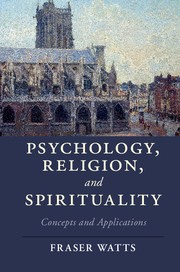Book contents
- Frontmatter
- Dedication
- Contents
- Preface
- 1 Concepts and Approaches
- 2 Psychoanalysis
- 3 Genetics and Evolution
- 4 Brain and Cognition
- 5 Religious Experience
- 6 Religious Practices
- 7 Religious Beliefs and Thinking
- 8 Spirituality
- 9 Developmental Aspects
- 10 Varieties and Types
- 11 Health and Adjustment
- 12 Personal Transformation
- 13 Scripture and Doctrine
- 14 Human Nature and Personality
- 15 Summing-Up
- Further Reading
- References
- Index
11 - Health and Adjustment
Published online by Cambridge University Press: 31 March 2017
- Frontmatter
- Dedication
- Contents
- Preface
- 1 Concepts and Approaches
- 2 Psychoanalysis
- 3 Genetics and Evolution
- 4 Brain and Cognition
- 5 Religious Experience
- 6 Religious Practices
- 7 Religious Beliefs and Thinking
- 8 Spirituality
- 9 Developmental Aspects
- 10 Varieties and Types
- 11 Health and Adjustment
- 12 Personal Transformation
- 13 Scripture and Doctrine
- 14 Human Nature and Personality
- 15 Summing-Up
- Further Reading
- References
- Index
Summary
Evidence is growing that religion tends to be good for health and adjustment. I will discuss the evidence for that in relation to physical health, mental health, and moral functioning. However, many complexities surround this relationship. There are particular complexities, as we will see, in the relationship between religion and mental health.
One recurrent issue is about the concept of “religion.” As we have seen in other contexts, religion is not a unitary construct. Different aspects of religion may have different associations with health and adjustment. It makes a difference what aspect of religion is measured. A parallel issue concerns sampling. Religious people are diverse, and what relationship is found between religion and other variables will depend on what range of religious people are sampled. For example, conservative religious people may give different results than more liberal ones.
Health and adjustment are difficult to measure too, and important distinctions need to be taken into account. Moral attitudes may give different results than moral behavior. Self-report measures of mental health may give different results than more objective, clinical assessments. Positive measures of good health may give results that are different from, and not merely the inverse of, those for pathology. Religion may have a different relationship with the risk of onset of a health problem than what it has with health outcomes among those who already suffer from the problem.
Yet another problem is that many research studies simply demonstrate that religion is associated with health and adjustment. They often seem to provide reasonable grounds inferring that religion has causal effects, but that is usually an assumption rather than something that has actually been demonstrated. There are, logically, at least two other possibilities. One is that religiousness is affected by health or adjustment; that is, people with certain kinds of problems (such as abuse of drugs and alcohol) may be less likely to be religious simply because of those problems. The other possibility is that the association between religion and health arises because both are related to some third variable. That is difficult to rule out definitively. However, candidates for that third variable, such as socioeconomic class, can be proposed and measured, and then statistical procedures can be used for checking whether the relationship between religion and health/adjustment still holds up when relationships with the third variable are allowed for.
- Type
- Chapter
- Information
- Psychology, Religion, and SpiritualityConcepts and Applications, pp. 136 - 148Publisher: Cambridge University PressPrint publication year: 2017

